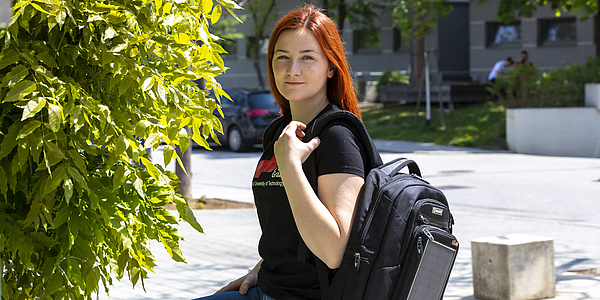For students, finding a good place to live is the first step to enjoying their stay in their university town. Lejla Otanović, international student at TU Graz, writes about dorms, apartments and their costs
Graz, the second-largest city in Austria, is not only rich in cultural heritage and architectural landmarks but also a great destination for students from all over the world. The city is known for its rich culture, impressive architecture and lively student life. With its combination of top-notch education and a dynamic student community, Graz offers a unique study experience that is hard to find elsewhere.

Despite all this, for students it can be challenging to move away and live on their own, especially for international students who move abroad and start living independently far away from home. Finding good accommodation is the first step to enjoying your stay in Graz. So, how should you start your search for a place to live?
Types of student accommodation
The first step in finding a place to live is to think about living on your own and deciding what preferences you have. There are three options for student accommodation in Graz:
- student dormitories (halls of residence),
- shared apartments (WGs) and
- single apartments.
There is something for everybody; it depends on what you prefer.
Student dormitories
When it comes to living in Graz during your studies, many students find that staying in a student dormitory is the best and most cost-effective option. Prices for dorms range from 200 to 500 euros, and this price includes internet, electricity and all other expenses. The cost depends on the number of people you share the apartment, bathroom and kitchen with. An additional advantage of student dormitories is that there is less paperwork in comparison with other accommodation options, since almost everything is already included in the price.
Dorms in Graz are mostly nice and well equipped, so you will not need to worry about having to get a bed, a desk or a closet (wardrobe). You would however need to provide your own pillow, blankets, dishes and cutlery, some dorms even provide you with those items.
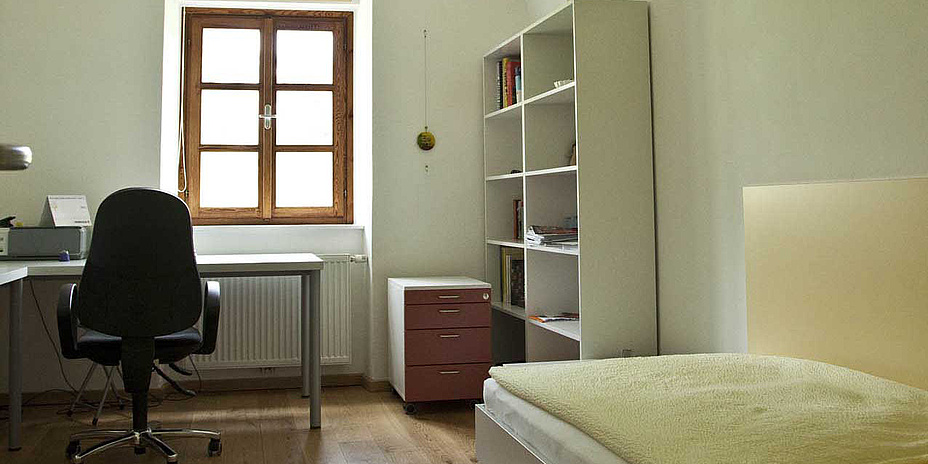
Most of the rooms in the dormitories are single rooms, but some of them can be double rooms, shared with another person. Double rooms are in most cases less expensive in comparison to single rooms.
Bathroom, toilet and kitchen are shared with other residents. Be aware that you will need to make some compromises. There are some dormitories that offer you your own room with a small kitchen and bathroom that only you would use. While this option is a mini-apartment, it tends to be more expensive.
Common facilities can be used after you contact the administration and submit a request. Those are facilities such as a study room or party room, which are free of charge. Washing machines in the laundry room also have to be prebooked. You get a laundry time slot in an app provided from the student dormitory. Every time slot costs 1 euro to wash your laundry, and 1 additional euro if you use the drying machine. Some dorms even have their own gym and recreational areas, but you can get more information on that topic at the website of the student dormitory that suits you the best.
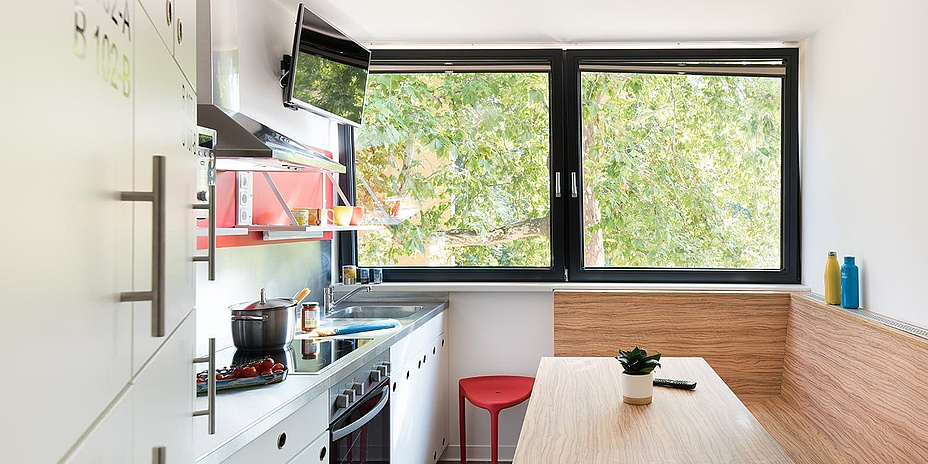
One of the benefits of living in student dormitories is their connection to public transport. Being close to bus and tram stops makes it easy for you without a car. Some of the dorms are also located within a short walking or biking distance from university buildings.
If you are considering staying in a student dormitory, it is advisable to submit your accommodation application one semester in advance. This allows you to secure a place before you apply for university, because the process of getting a response can take some time.
Be careful about the deadlines of your chosen student dormitory. You can find all the information about filing the papers at their website.
Shared apartments
Shared apartments are a popular living option for students in Graz. Meeting new people who are already in Graz for a longer period of time is an advantage because your flatmates can show you around and can get you up to speed with Graz student life.
Every tenant has a bedroom of their own, but the common areas are shared, such as kitchen, bathroom and living room. This gives you an opportunity to hang out with your roommates more and to meet people from different backgrounds.
Sharing a bigger flat with mostly two to three roommates is also cost-effective and the rent ranges between 250 and 500 euros per month. The price depends on location, size of the apartment, number of roommates and sometimes type of building (some apartments that are in older buildings tend to cost less). Keep in mind that you might also have to pay for the furniture in your room, if you inherit some of it from the previous tenants. If that is not the case, you would have to furnish it yourself.
When it comes to shared apartments, it is important to choose housemates with whom you are compatible in terms of lifestyle, cleanliness, noise levels and other habits. Some ads for shared apartments will include a description of the current roommates and their preferences and you can meet them before moving in.
Single apartments
For those who value their own space, a single apartment is the best option. You manage and control everything yourself, from your personal space to your own cleaning schedule. Single apartments offer you more space, which can be more comfortable in comparison to other living options.
Even though it sounds appealing, it comes at a price since single apartments are more expensive than the other options. Be sure to bear that in mind if you decide to live in an apartment. The process of getting it is also very stressful, because looking for it can take some time. You will need to do everything on your own, including registering electricity with the responsible authorities and furnishing the apartment if you have not inherited anything from previous tenants.
If you choose to live in an apartment, make sure you find out about the type of heating in that apartment, because it can also cost you more than you anticipated.
Most landlords do not include heating and electricity costs in the monthly rent, so make sure you inform yourself about the terms and conditions along with all the costs from your landlord.
Be prepared to provide documents such as proof of income, a valid ID or passport, and sometimes a letter of reference. Before signing a tenancy agreement, you should carefully review it, including terms for rent, utilities, deposit and duration of the lease. Make sure you understand all the terms before signing.
Be especially careful of the minimum required duration of stay and the cancellation period. Keep in mind that you should not pay any commission, deposit or advance payment before you have signed the tenancy agreement.
Having your own apartment is good, but it also comes at a bigger price and stress in comparison to student dormitories. The average rent for an apartment ranges from 12 to 15 euros per square metre.
Housing costs
No matter what accommodation you choose, you will have to pay a deposit for your room or apartment which is normally the equivalent of 3 months’ rent. After you move out, you get the deposit back onto your bank account – under the condition that the room looks the same as when you first moved in, and that there is no damage to walls and floors, etc.
My advice
My advice for your first student accommodation is to go for a student dormitory or a shared apartment. Be open to different types of accommodation to best suit your needs. I imagine that you are also probably looking forward to meeting new people, so this would be a great way of getting to know other students. As an international student, you would not feel lonely when you are surrounded by lots of people who are in the same or similar situation as you.
Speaking from personal experience, my first student accommodation in Graz was a student dormitory. During those four years living in a dorm, I met more than 20 people from 10 different countries – and those were just my flat mates with whom I shared the apartment. I also got to know by chance some people in the shared laundry room and once in an elevator, one of whom now happens to be one of my best friends. Before I moved in, I did not know that living in a dorm can be such a mix of fun and challenges. This way, I met and also learned to live with people from different backgrounds and cultures.
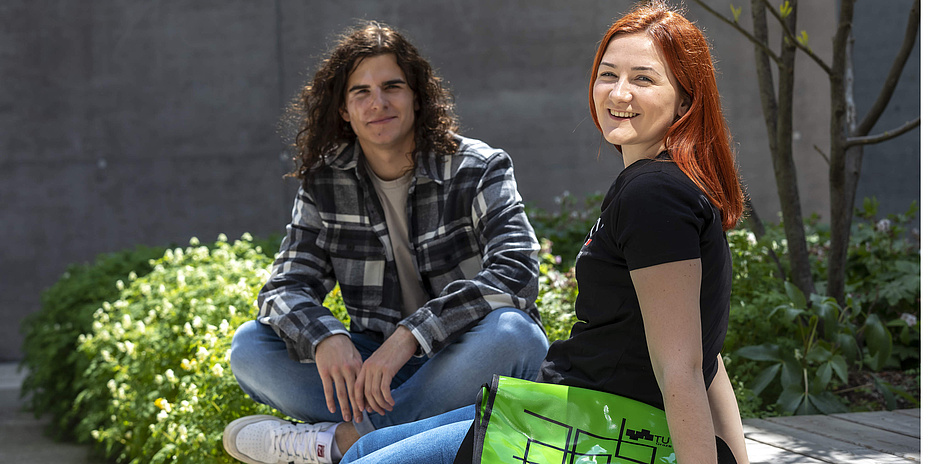
Finding accommodation in Graz
Finding accommodation involves several steps. After you have decided what you prefer, make sure to establish your budget for rent and extra costs. Consider the location regarding proximity to the university and public transport. Make a list of pros and cons to consider all the factors. You can prepare some questions and arrange appointments if you have decided to share an apartment. In addition, prepare the required documents, for example application forms and in most cases a confirmation of completed education for student dormitories.
Platforms for your accommodation search:
- You can search online on social media such as Facebook, where you can join local groups that publish ads for shared or single apartments.
I would suggest that you start looking as soon as possible, so you can compare different offers and see what works for you and what does not. - You can check out the leaflet “Accommodation in Graz” on the website of the Welcome Center of TU Graz (button “Accommodation in Graz”). By the way, the Welcome Center supports international students before they arrive as well as during their stay.
- You can also take a look at "HTU Graz campus board".
- There are a lot of other sites where you can find student accommodation in Graz; here is a list which might be helpful:
- Dormitories: iam student, studium.at Studentenheime, OeAD student housing
- Shared Apartments and Apartments: WG-gesucht, Wohnung mieten in Graz - willhaben;
on Facebook (Wohnungen in Graz – ohne Makler, Wohnungen Graz – provisionsfrei, GRAZ: Wohnungen ohne Provision)
Legal matters
After you have found your accommodation and signed the contract, you need to register your residence at the relevant registry office within three days after moving into your accommodation in Austria. For registering your residence, you would need an application form and a passport. You can find more information at the website of the city of Graz: Stadt Graz: Wohnsitz anmelden | Meldezettel | Meldeamt - Stadtportal der Landeshauptstadt Graz.
If you are from the EU or Switzerland and plan to stay in Austria for more than three months, you are required to get a registration certificate.
I hope that this blogpost will answer all your questions related to finding your first accommodation. If you have any more questions, do not hesitate to ask – I am here to help you out. I am also looking forward to seeing you in Graz, enjoying our student atmosphere!
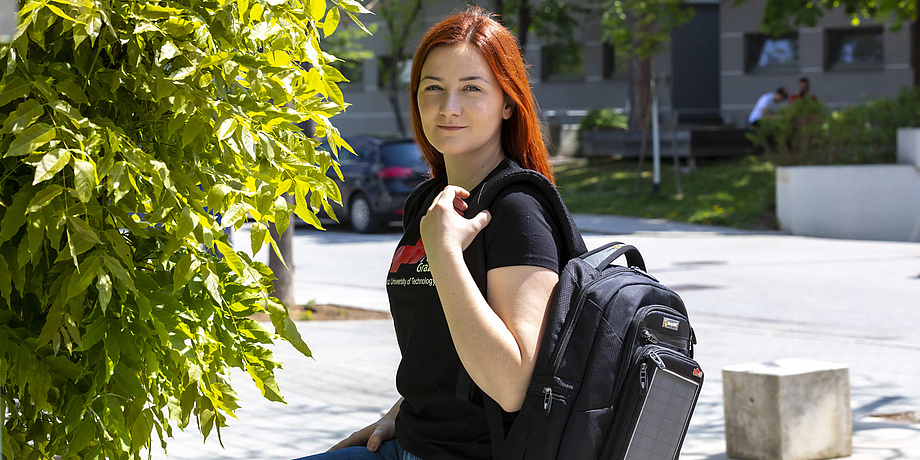

![[Translate to Englisch:]](https://www.tugraz.at/fileadmin/_processed_/0/f/csm_Historic-centre-Graz-Austria-by-Lunghammer-tugraz_51220f8f5e.jpg)
